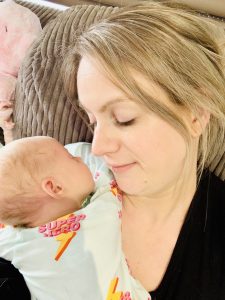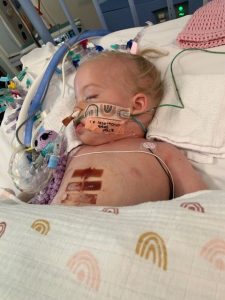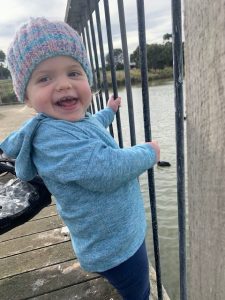Thank you so much for your support in 2021. Together, we raised an incredible $270,000 at Christmas time. Your generosity gave sick children like Riley the greatest gift of all: Christmas with their family.
For many families, this Christmas is set to be one of joyous celebrations, which is especially true for two year old Riley and her family. Just 12 months ago, the family were facing one of the hardest challenges of their lives.
When Katrine and Rob found out they were pregnant with Riley, they were elated with the news that their family was growing and their son Liam would have a sibling. However, at Katrine’s 20 week scan doctors realised something was wrong with the baby.
“They did multiple scans and saw a little cystic structure, but they couldn’t tell us exactly what it was. They said once the baby was born they’d be able to know more. It was very stressful with all the unknowns,” said Katrine.
Despite their concerns, Riley’s birth was relatively uneventful but initial scans of her liver weren’t conclusive, so their doctors couldn’t tell them exactly what was wrong with their little girl. Katrine and Rob were told to wait and monitor her condition.

Katrine with baby Riley. Image: supplied.
“She was a really quiet baby and was very lethargic. We had to wake her for food,” said Katrine.
With her test results getting worse, Riley was transferred to The Royal Children’s Hospital (RCH) at 32 days old to get the specialised tests and treatment she needed.
Finally, the family got answers. Riley was diagnosed with biliary atresia, a congenital disease which causes abnormal bile ducts in the liver.
“Without early surgical intervention to remove the abnormal bile ducts and achieve successful bile drainage from the liver to the intestines, Riley’s condition was fatal,” said Dr Jeremy Rosenbaum, a paediatric gastroenterologist and one of Riley’s treating clinicians.
She immediately underwent surgery to attach a piece of the small intestine to the liver, which allowed bile to flow, and simultaneously removing as many damaged bile ducts as possible. While the procedure was initially successful, months later there were complications.
“After the surgery, Riley still had progressive liver disease as well as other associated problems, including repeated infections and blood clots. Eventually, she developed liver cirrhosis and portal hypertension and her only option was liver transplantation,” said Jeremy.
Aged just one year old, Riley was added to the liver transplant list and the family waited by the phone for a life-saving call. Six months later, on Christmas day, Katrine and Rob received the best gift of all – the phone call confirming a liver had become available for Riley.
“It was a crazy feeling. We were so relieved, but at the same time we knew another family had gone through the worst time in their life to give Riley a chance,” said Katrine.

Riley in PICU. Image: supplied.
The next day Riley was taken into the RCH for surgery. Hours went by before the first update came – Riley’s damaged liver was in very bad shape and it would take a long time to remove. She had lost a lot of blood, but she was stable. After a long and nerve-wracking 12 hour wait, Katrine and Rob were called into see her in the Paediatric Intensive Care Unit (PICU).
“The room was a hive of activity, with all her nurses and doctors. She was attached to a large number of tubes, wires, machines and ventilators which were helping her breath. It was a shock to go in there but were just happy that she had made it through,” said Katrine.
Sadly, this relief didn’t last. Late one night, a couple of days later, a call came. Things weren’t going well, and Riley was going to need another transplant urgently. In the meantime, she had to be stabilised until they found a new liver.
“She was on kidney dialysis, she had renal failure, she was intubated. She was getting blood transfusions throughout the day; the doctors and nurses were doing everything they could to keep her alive,” said Katrine.
“They told us just don’t think about tomorrow, think about the next hour. Just get through the next hour. It was the worst time of our lives,” said Katrine.
In desperation, Katrine and Rob both offered to donate part of their own livers. Rob was found to be compatible, and preparations were made for the transplant to go ahead with part of Rob’s liver.
Then they got the call. Finally, another life-saving liver was available. Riley was given another chance.
“We met with the surgical team after the operation and from the look on their faces, we could tell things had gone a lot better. The relief we felt is difficult to put into words, but we finally felt hope that Riley would come out of this okay,” said Katrine.
After over 50 days in PICU, Riley was finally able to go home.
“There is still a lot of therapy, hospital visits and lifelong medication. There is always the risk of organ rejection in the back of my mind. But her future is bright. She’s surprised everyone with how well she’s gone,” said Katrine.

Riley enjoying being out of hospital. Image: supplied.
Although her hospital journey isn’t over, Riley is enjoying going to day care, ballet and being a cheeky sister to her brother Liam. When you see her, you wouldn’t know she is the beneficiary of not one but two liver transplants.
“Her clinical nurses talk to us all the time. Her surgeons, her consultants, they’re amazing. They’re life savers. They have saved her life. But they also look after the whole family. We are so lucky to be where we are and have access to it,” said Katrine.
This Christmas, the family hope they can spend the day at the beach with family. Riley is a big fan of Frozen and Emma Wiggle, so there will be a lot of singing and dancing over the festive season. This was all made possible thanks to the specialised care available at the RCH.
“The care that the hospital gives us, it is really world-class. Through donations they’re able to make this possible, so thank you,” said Katrine.
Will you give a Christmas gift today to help children like Riley spend Christmas with their families?